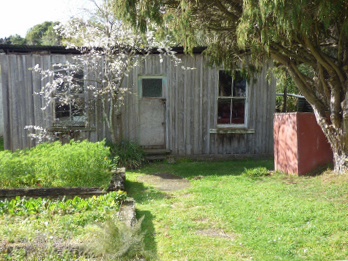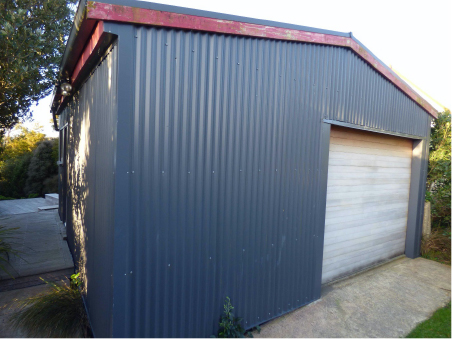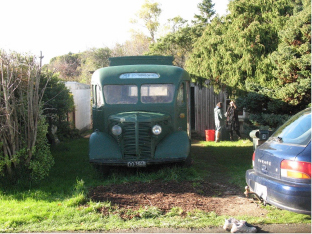
The history of the Broad Bay Co-op
Background
The Broad Bay Co-op began in the late 1970s (probably about 1976, but the date is uncertain even amongst the founding members). It was started originally as a way of providing goods to a group of vegetarians. At the time, items like wholemeal flour, pulses and even nuts other than walnuts were difficult to source from the local dairy. This was pre-supermarket days. These dry goods were purchased in bulk and then repacked in smaller quantities for sale to members. Running parallel was purchasing and distributing fresh fruit and vegetables, and this service is what remains today.
Location
The co-op operated originally out of a garage at 19 Virginia Avenue, then owned by Hendrik and Ellie Koch.

Then we built our own building on the corner of Waikana and Clearwater Streets on land owned by Peter and Rosemary Johnson. The shed was constructed by members using largely recycled timber and with a false front in the style of a US Wild West building.

co-op building on corner of Clearwater and Waikana Streets
This was eventually demolished to make way for a two-storey house.
When the Johnsons had to sell that section, the Co-op was offered the current building diagonally opposite at 3 Clearwater Street, owned by Kevin Sargent, in return for paying the rates. (The membership fee or levy now covers the rates.) The building had previously been a family home and some recalled how the original owner always kept it meticulously clean, even scrubbing the steps daily. Currently we still have the same oral agreement with the owner, although there is no security of tenure. The shed is neither connected to the town water supply, nor does it have electricity.
For several years, Vic Mills’ heritage bus was parked in front.


The Broad Bay Community Garden, which is on the same site, was first established on one side of the section in 2011, but it has always operated as a separate entity. Once the bus was moved, the Garden extended to the front of the Co-op building as seen in the photo above.
The Co-op as a Social Hub
Most of the early members were households with children and the Co-op acted as a social centre. Potluck dinners were held monthly, and weekends at Tautuku Adventure Camp were very popular. A potluck Christmas dinner was held at different homes, most notably at ‘The Retreat’ in Moss Street, Portobello, owned by Joan and Peter Wilson. Being the organiser of such events was one of the Co-op roles, but these days people no longer join the Co-op for its place as a social hub.

Transition to Fruit and Vegetables Co-op
In the 1970s, all fruit and vegetables from growers were sold at the time through auctions, and there were two main auction houses, both near the corner of Midland and Timaru Streets. We had accounts with both and the buyer moved between them to get the best deal. The mark-up by the time fruit and vegetables reached the stores or dairies was 100%, so it made sense for us to buy our produce directly, so much more cheaply. However, one had to buy by the case or sack (for potatoes, kumara, carrots and onions), which is why the co-ops grew up. There were several thriving co-ops, but as far as we know, Broad Bay (formerly known as the Broad Bay and Portobello Co-op – with the auction code of BAP) is the only original one surviving.
One bid a price per case, but there might be 12 cases. The highest bidder got that line and could say how many cases they wanted, and that then set the price for the rest of the line. If there was anything left, the big buyers could still negotiate a reduced price for the remainder, but if they wanted to be sure of getting something they had to go with the original price bid. The auctioneers liked the co-ops because we could afford to offer a high price (which was still cheaper for our members than retail), but we were not so popular with the commercial buyers. The co-ops were also favoured by the auctioneers because we would buy new items like capsicums which at that time were not freely available. Often the auctioneers would ask us, ‘How do you cook or prepare that particular fruit or vegetable?’.
Later, the supermarkets began buying their produce directly from growers, so the profit was not so great, and, without them buying, the auctions died.
When the auctions ceased to operate, we began purchasing from Turners and Growers, but then the Farmers’ Market started and Co-op members began going there, getting stuff cheaper and fresher, and it became hard to sell whole cases of produce. We thought we might have to close, but found that we could buy smaller amounts at the Farmers’ Market, tailoring them to the wishes of members.
As noted, in the early days there were a number of co-ops operating in Dunedin, and most eliminated wastage by supplying prepacked boxes. One got a swede or a turnip, even if one’s family would not eat them. The Broad Bay/Portobello Co-op always operated like a shop, which is one of the reasons we are now the longest surviving co-op in Dunedin, but that meant we needed to put on a suitable markup to cover what was often not inconsiderable waste.
From time to time the Co-op has purchased from local suppliers and still buys eggs locally.
Also, from time to time, organic citrus fruit and avocados from North Island growers are distributed to Co-op members.
Financial considerations
Having the Co-op operating like a shop did mean that often you missed out on what you really wanted, and it did put pressure and extra worry on the buyers. Recently when it looked as though we would have to fold because the wastage was outstripping the mark-up, and membership was down, we decided to let people pre-order, even though this actually means more work and time for the buyers, who have to sort everything at the shed. However, by drastically cutting wastage to almost nil, it has allowed us to break even again and sometimes even make a small profit, without having to increase the mark-up to the point where it’s cheaper to buy at the supermarket — even if one drives there. We have actually made a profit most weeks and built up a small amount of capital, for the first time for many years.
At its height, the Broad Bay Co-op had a limit of 30 households, with a waiting list to join. Today it has 25 member households who live from Company Bay to Harwood.
A Co-operative
The Co-op has no paid staff and all the tasks, from market buyer to cleaner to treasurer, are rotated around members. Without the social function, the Co-operative has become merely a purchasing and distribution centre that cuts down on the need to travel into town to shop.
By Lala Frazer (Co-op member from 1978 to the present day)